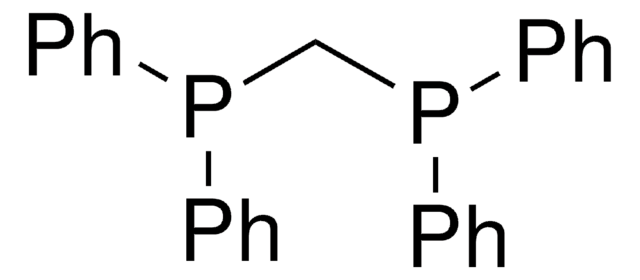92360
Clorotrimetilsilano
puriss., ≥99.0% (GC)
Sinónimos:
Cloruro de trimetilsililo, TMCS, Trimetilclorosilano
About This Item
Productos recomendados
vapor density
3.7 (vs air)
Quality Level
vapor pressure
100 mmHg ( 25 °C)
grade
puriss.
assay
≥99.0% (GC)
form
liquid
autoignition temp.
752 °F
expl. lim.
6.4 %
refractive index
n20/D 1.387 (lit.)
bp
57 °C (lit.)
mp
−40 °C (lit.)
density
0.856 g/mL at 25 °C (lit.)
SMILES string
C[Si](C)(C)Cl
InChI
1S/C3H9ClSi/c1-5(2,3)4/h1-3H3
InChI key
IJOOHPMOJXWVHK-UHFFFAOYSA-N
¿Está buscando productos similares? Visita Guía de comparación de productos
General description
Application
- Chlorotrimethylsilane can be a non-toxic alternative to mercuric chloride as activator in samarium-promoted cyclopropanation of both allylic and α-allenic alcohols.
- It can be used in combination with hexamethyldisilazane for the protection of alcohols by forming trimethylsilyl ethers via silylation.
- It is employed in chloromethylation of polysulfones (PSUs).
- It activates lithium hydride to convert it into a hydride source for the reductive silylation of carbonyl compounds.
- Chlorotrimethylsilane/lithium bromide forms an effective reagent for the conversion of alcohols to bromides.
- Chlorotrimethylsilane/sodium iodide in acetonitrile is a better alternative to iodotrimethylsilane for the cleavage of esters, lactones, carbamates, and ethers. It can also be used for the conversion of alcohols to iodides.
- Chlorotrimethylsilane along with silver or ammonium nitrate forms an efficient regioselective nitrating reagent for the ipso-nitration of arylboronic acids to form the corresponding nitroarenes.
- Chlorotrimethylsilane along with sodium nitrite or nitrate can be used for deoximation reactions.
Other Notes
signalword
Danger
Hazard Classifications
Acute Tox. 3 Inhalation - Acute Tox. 3 Oral - Acute Tox. 4 Dermal - Eye Dam. 1 - Flam. Liq. 2 - Skin Corr. 1A
supp_hazards
Storage Class
3 - Flammable liquids
wgk_germany
WGK 1
flash_point_f
-18.4 °F - closed cup
flash_point_c
-28 °C - closed cup
ppe
Faceshields, Gloves, Goggles
Elija entre una de las versiones más recientes:
¿Ya tiene este producto?
Encuentre la documentación para los productos que ha comprado recientemente en la Biblioteca de documentos.
Los clientes también vieron
Artículos
Results of a study involving the ability few Fluka silylating reagents to form GC-MS-compatible trimethylsilylmethyl derivatives of NSAIDs
Results of a study involving the ability few Fluka silylating reagents to form GC-MS-compatible trimethylsilylmethyl derivatives of NSAIDs
Results of a study involving the ability few Fluka silylating reagents to form GC-MS-compatible trimethylsilylmethyl derivatives of NSAIDs
Results of a study involving the ability few Fluka silylating reagents to form GC-MS-compatible trimethylsilylmethyl derivatives of NSAIDs
Nuestro equipo de científicos tiene experiencia en todas las áreas de investigación: Ciencias de la vida, Ciencia de los materiales, Síntesis química, Cromatografía, Analítica y muchas otras.
Póngase en contacto con el Servicio técnico









![(11bR)-2,6-Bis(diphenylphosphino)-N,N-dimethyldinaphtho[2,1d:1′,2′-f]-1,3,2-dioxaphosphepin-4-amine](/deepweb/assets/sigmaaldrich/product/structures/260/755/3101c3e8-e884-4803-ba52-a87c7e168847/640/3101c3e8-e884-4803-ba52-a87c7e168847.png)
